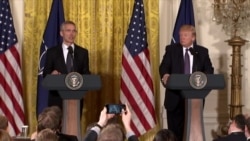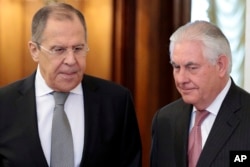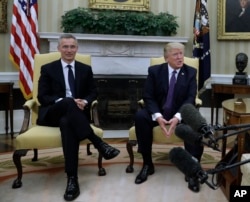U.S. President Donald Trump on Wednesday declared the North Atlantic Treaty Organization “no longer obsolete,” three months after he said the alliance had outlived its usefulness because it had not defended against terrorist attacks.
“The secretary general and I had a productive discussion about what more NATO can do in the fight against terrorism,” Trump said at a joint news conference with NATO chief Jens Stoltenberg. “I complained about that a long time ago and they made a change, and now they do fight terrorism. I said it was obsolete. It’s no longer obsolete.”
Watch: Trump, Stoltenberg Discuss NATO
Trump also reiterated his complaints made during German Chancellor Angela Merkel’s recent visit about other NATO countries not paying their fair share for defense.
The president, standing in the East Room alongside Stoltenberg, said NATO members must “meet their financial obligations and pay what they owe. Many have not been doing that.”
All NATO countries have agreed to spend 2 percent of their gross domestic product on their own defense by 2024, but only a few of the member countries currently meet that goal. The U.S. spends about 3 percent of its GDP on defense, while Germany spends about 1.2 percent.
“Fair burden sharing has been my top priority since taking office. We have now turned a corner,” Stoltenberg said during the joint news conference.
Hours before the event, a U.S. official agreed that better burden sharing is “on the right trajectory,” noting that for the first time in 2015 and 2016, after a collective decline in allies’ national defense budgets, the numbers “started to peak back up.”
Russia, the leading adversary that compelled the creation of NATO in 1949, also was discussed by Trump and Stoltenberg.
“We don’t want a new cold war; we don’t want a new arms race,” said the NATO secretary general. “We strongly believe that there is no contradiction between a strong NATO, a credible deterrence on defense, and political dialogue with Russia.”
U.S. Secretary of State Rex Tillerson met Wednesday in Moscow with his Russian counterpart Sergei Lavrov and, then, with President Vladimir Putin. Following the meetings, Tillerson said he told Putin that U.S.-Russia relations were “at a low point.”
Trump, in his remarks hours later, amplified that assessment, saying, “we may be at an all-time low in terms of relationship with Russia.”
The U.S.-NATO meeting at the White House and the U.S.-Russia discussions at the Kremlin were held a day after Trump gave his official approval for the small Balkan country of Montenegro to join NATO. Montenegro’s accession, which the U.S. Senate voted overwhelming to support last month, will make clear that no third country (i.e. Russia) will have veto power over NATO membership, said a U.S. official, speaking to reporters on condition of anonymity.
Russia has described Montenegro's NATO membership as a "provocation," due to the country's geographical proximity to Russia. The Kremlin has long seen the Balkans as inside its "sphere of influence." The official added that while it is not anticipated that any other countries will join the alliance in the near future, the door remains open.
Trump and Stoltenberg also discussed NATO’s role in supporting international efforts to fight terrorism globally. NATO commanded the U.N.-mandated International Security Assistance Force in Afghanistan for 11 years from August 2003.
Trump announced Wednesday he is sending to Afghanistan his national security adviser, Army General H.R. McMaster, “to find out how we can make progress alongside our Afghan partners and NATO allies.”
During the Wednesday afternoon rush hour in Kabul, a suicide bomber killed five people in an attack near the Ministry of Defense. The Islamic State group claimed responsibility.










